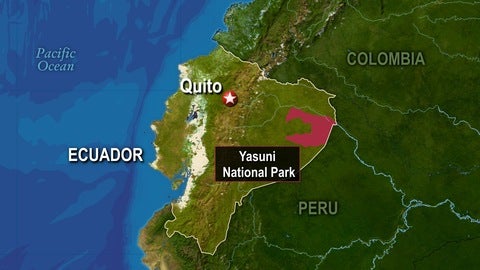Prof. Simron Singh, the INDEV 101 guest speaker this week, delivered a talk entitled “Yasunizar and Environmental Justice in the Ecuadorian Amazon”. Prof. Singh is a social/human ecologist and currently teaches sustainability concepts and methods for the MDP program at the University of Waterloo. Following are our reflections on the topic of environmental justice and development.
The prosperity of the economy is greatly valued by all, as it determines whether there will be sufficient money to fulfil the needs and wants of countries, communities and individuals. Oftentimes, the environment becomes of minor importance when governments make decisions to better the economy. The case of Ecuador is an example where economic activities perpetuate environmental injustices.
Ecuador is heavily dependent on oil resources for its economy. Although, this economic activity is viewed as a way for the country and its people to prosper, extracting oil from the Yasuni National Park (a UNESCO biosphere in the Amazon) has a high potential to cause environmental degradation. Other than being a large carbon sink, the Amazon provides many resources such as oxygen, food, and shelter to many species. Oil extraction not only puts the environment at risk, but also threatens the livelihood of the people living near the Amazon, the Yasuni people.

Source: Cuenca High Life
Inequality is also very evident between the Yasuni people and the mining companies. Oil drilling companies compromise the development and livelihood of the Yasuni people who have little power and choice when it comes to utilizing the resources of the Amazon.
Dutch Disease refers to a condition in which a country is economically reliant on one specific industry or resource. Ecuador is an example of a nation that is currently plagued by the Dutch Disease. The term disease in this instance, seems to be aptly chosen, as the condition leaves the country vulnerable to a host of external factors, including reliance on foreign investment and vulnerability to fluctuating market conditions.
How is this relevant to development? The Sustainable Development Goals are development-oriented goals that are meant to be sustainable! Clearing thousands of acres of biologically diverse rainforest to support oil drilling operations is clearly anything but sustainable. Sustainability implies using resources responsibly now, to provide for future generations. In development, we must consider yesterday, today, and tomorrow! Decisions made now must consider those who will come afterwards. Because we are living in an increasingly globalized community, a country should also consider how its actions will impact another.

The battle between economic prosperity and environmental conservation is seen around the globe. More recently and closer to home, it is easy to see a parallelism between what is happening in Ecuador and the highly politicized controversy over the oil sands and an expansion of new pipelines on Canada’s West Coast. Reports have even gone so far as to characterize Alberta’s economy as running the risk of a Dutch Disease. Furthermore, analysts say that this crisis could, “pose a significant risk to Canada's competitiveness in the emerging, clean energy economy" (Press, 2012). Put simply, there isn’t one clear solution. Even in a developed and affluent nation such as Canada, the desire for economic advantage drowns out the significance of other values. Looking ahead, the only way lasting change will be made, is if we start changing our mindsets now.
Reference:
Press, T. C. (2012, May 30). Oilsands fever seen as Canada's Dutch Disease. Retrieved March 12, 2018, from CBC